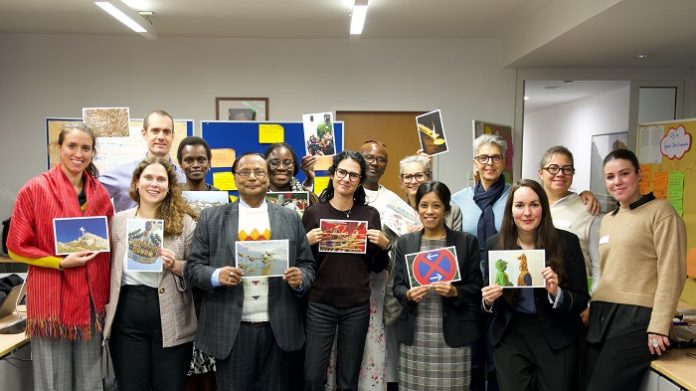Every year, millions of people suffer premature deaths due to pollution. However, men and women are affected differently due to a combination of biological and social factors.
In response to this issue, the “Gender & Chemicals Partnership” (G&CP), a unit of the “Multi Stakeholder Processes for Sustainable Development, Germany,” organized its first Assembly on November 18-19, 2024, in Berlin.
The event, hosted at the office of the German Federal Ministry for the Environment, Nature Conservation, Nuclear Safety, and Consumer Protection (BMUV), aimed to address the pollution crisis through a gender-responsive approach. The meeting received support from BMUV and the UNDP.
Dr. Bipul Saha, a chemical industry expert from India and an Executive Board member of IUPAC (International Union of Pure and Applied Chemistry), attended the event.
Gendered Impact of Chemical Exposure
Women and men face different levels of exposure and risk from hazardous chemicals.
In many cases, women experience higher levels of exposure and greater health impacts due to both biological and social factors. Some examples include:
• Exposure to Highly Hazardous Pesticides (HHP) during harvesting.
• Cleaning pesticide containers.
• Handling hazardous chemicals in the production of electronic goods and waste processing.
• Lead exposure from paints.
• Endocrine-disrupting chemicals affecting women’s reproductive systems.
It is essential to conduct detailed gender-based studies to better understand the disproportionate impact of chemical exposure on women, who are often more vulnerable to its adverse effects.
About the Gender & Chemicals Partnership (G&CP)
The G&CP is an international, multi-stakeholder initiative that unites government representatives, academics, civil society, and industry players to build a safer, more sustainable chemical and waste management system that is inclusive of all genders.
The partnership aims to promote gender equality, empower women and girls, and contribute to the achievement of the UN Sustainable Development Goals, particularly SDG 5: Achieve gender equality and empower all women and girls.
Key Stakeholders and Participants
The first G&CP Assembly brought together delegates from various global organizations, including the United Nations Development Program (UNDP), United Nations Institute for Training and Research (UNITAR), and the German Federal Ministry for the Environment. Notable participants included:
• Monica Kapadia (UNDP)
• Jorge Ocana and Oliver Wotton (UNITAR)
• Josephine Moldenhauer (BMUV)
• Miriam Medel (Government of Mexico)
• Sherica Whitelocke-Ballingsingh (Jamaica)
• Anna Becker (Germany)
• Nancy Marangu and Annabell Waititu (Kenya)
• Bipul Saha (India)
The G&CP’s host organization was represented by Dr. Minu Hemmati, Anna Holthaus, Tatiana Fett, and Micheline Kolmitz.
Objectives of the Gender and Chemicals Partnership
The G&CP focuses on the following objectives:
• Raising awareness about the connections between gender, chemicals, and waste.
• Supporting gender-based data collection and research.
• Assisting governments in developing gender-responsive national action plans for chemical and waste management.
• Contributing to the creation of a database on gender-specific epidemiological health data related to chemical exposure, which will inform the development of targeted policies.
• Facilitating knowledge-sharing, training, and education programs on gender and chemicals.
• Promoting gender-responsive chemical hazard/risk communication strategies and chemical safety training.
• Providing input to international policy processes on chemicals and waste.
• Strengthening the gender dimensions in global discussions on chemicals and waste, such as those held at the United Nations Environment Assembly, WHO, and the UN General Assembly.
The first Assembly was a crucial step in realizing these objectives, setting up working groups and formal structures to drive progress toward safer chemical management for all genders.
Partnership Structure and Governance
The G&CP is structured around several key bodies:
• G&CP Assembly
• Board
• Working Groups
• Secretariat
During the meeting, four working groups were established to focus on different areas of gender and chemical management.
Dr. Bipul Saha was appointed as the Co-Chair of the ‘Education and Training’ group, alongside Mariella Noto. This group will work to raise awareness and influence global policy discussions on the intersection of gender, chemicals, and waste.
Election of the Board
The following organizations were selected to serve on the G&CP Board:
• Global South: Foreign Office, Mexico
• Global North: BMUV, Germany
• Intergovernmental Organization: UNITAR
• Stakeholder Organizations: ZDHC and CARPIN
Formation of Working Groups and Co-Chairs
The following working groups were formed, with the designated Co-Chairs:
1. Gender Data & Information
o Board: Josephine Moldenhauer (BMUV)
o Board: Sherika Whitelocke-Ballingsingh (CARPIN)
2. Education & Training
o Board: Mariella Noto (ZDHC)
o Non-Board: Bipul Saha (individual member)
o Non-Board: Hanna Andrea Rother (University of Cape Town)
3. National & Regional Level Implementation
o Board: UNITAR
o Non-Board: Annabell Waititu (IEWM)
4. International Policy Processes
o Board: Miriam Medel (Mexico)
o Non-Board: Nancy Marangu (ChemiChemi Foundation)
The working groups have already begun holding meetings and developing action plans to advance their goals.
Conclusion
The connections between gender and chemicals have become increasingly recognized in international processes. At the 5th International Conference on Chemicals Management (ICCM5) in Bonn in September 2023, the “Global Framework on Chemicals – For a Planet Free of Harm from Chemicals and Waste” (GFC) was established.
A key principle of the GFC is gender equality, with a specific gender resolution (Resolution V/4) adopted to promote the empowerment of women and girls in chemicals and waste management. This resolution calls for the development of a gender action plan to enhance women’s participation in decision-making processes and to implement gender-responsive policies globally.
Given these developments, it is now more important than ever for the chemical industry to integrate gender considerations into their operations. Collecting gender-disaggregated data will be essential for future analyses and for creating more inclusive, effective policies.
Report on the International Meeting on Gender and Chemical Pollution in Berlin
Advertisement
































